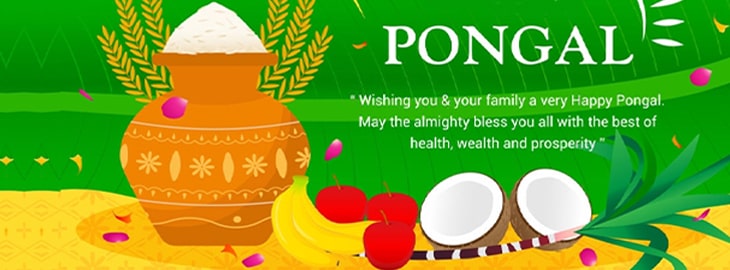Pongal is a crop festival which is celebrated in Tamil Nadu for four days. It is the most well-liked festival and is mainly celebrated in the southern states of India 4 days to devote a vote of thanks to nature. It is delight in the month of Thai (January - February) during this period when crops like rice, sugarcane, turmeric, etc. are being harvested.
Pongal is likely to fall on 14th or 15th January and is the most essential Tamilian festival. Tamilian has a strong confidence, belief that family problems will be resolve during the Tamil month Thai start on the Pongal day. The famous saying Thai Pirandhal Vazhi Pirakkum meaning Along with joy and happiness, the month Thai will also bring new occasions is often quoted in respect to Pongal festival. This month is meant to be favorable for wedding ceremony.
Ceremonies performed in the festive carnival
The First Day
The first day of the festival is celebrated in the respect of Lord Indra as Bhogi festival. Lord Indra is said to be the God of rain, that is why, he is being grateful for providing affluence to the land.
On this day, people throw their useless house items into the bonfire made up of wood and cow dung cakes, that is why, it is also observed as Bhogi Mantalu. Songs are sunging in the esteem of God and dance is performed around the bonfire by the girls. In order to keep warm during winter solstice, bonfire is illuminated.
The Second Day
Some ceremony is being carried out along with worshipping, on the second day of festival. The rice is boiled in the milk in a pottery pot outward the house which is then owed to the Lord Sun along with other served. People put their traditional clothes and accessories. The ritual utensils used in the ceremony are willing off by the husband and wife. A turmeric plant is attached with the pot which has to be used for boiling rice.
Following offerings are also incorporated -
- Two sticks of sugarcane are decorated in the back side.
- Dishes are moves with the coconut and bananas.
The most ordinary ritual of pooja is to trace before the house in a customary way using the white lime powder. This ritual is followed early in the morning after bathing by the woman of the house.
The Third Day
The 3rd day of festive carnival is known as Mattu Pongal which is meant to be the day for cows. Cows are worshipped after adorn with multi colored bells, swag of flowers, tinkling bells and sheaves of corn. After feeding cows with Pongal, they are taken to villages. Reverberating sound of their bells attracts the villagers and the men arrange a race within cattle’s. In order to wave off the evil eye, Aarti is carried out on cows. Due to joy among people, the atmosphere will also be filled with fun and happiness.
The Fourth Day
The final day of festival is known as Knau or Kannum Pongal Day. A turmeric leaf is washed correctly and is then placed on the ground. The relics of sweet and Venn Pongal, normal rice, colored rice, plantains, betel leaves, betel nuts and two pieces of sugarcane are placed on that leaf by the woman of the house before bathing. All the leady of house gather in the bailey of their house. In the middle of leaf, rice is placed and prays for their brother’s family to flourish. With turmeric water, rice and limestone, Aarti is carried out for brothers. And this water is sprayed on the Kolam in front of the house.
Legend behind celebrating Pongal
As per the legend, Lord Shiva sent his bull, Nandi to the earth in order to ask the mortal to have a daily oil massage and bath and to have a serving of food once in a month. But Nandi promulgate that everyone have an oil bath once in a month and a daily meal. This enrages Lord Shiva and he accurst Nandi to live on the earth forever. Tillage of fields and helping people in the manufacture of more food will be his tasks. Hence, this day is related to the livestock and harvest of crops for new yield.
Historical Viewpoint on Pongal
Pongal is mainly celebrated in southern states of India specially Tamils. It was exposed as Dravidian harvest festival in the Sangam Age in between 200 B.C. to 300 A.D. and this is also mention in Sanskrit Scriptures.
In Sangam era, maidens observed Pavai Nonbu which was very popular during the empire of Pallavas. It was celebrated during Margazhi, a Tamil month. On this day, girls implore for rain and shower of affluence on our country. Whole month, they maintain a distance with milk and its products. They don’t even oil their hair and self-control themselves from using the harsh words while converse. Bathing early was also a ritual. They carve the idol of Goddess Katyayani using wet sand and then worship it. They end this penance on the first day of Tamil month Thai. Due to these Institution and traditions, pristine age gave arise to Pongal.



